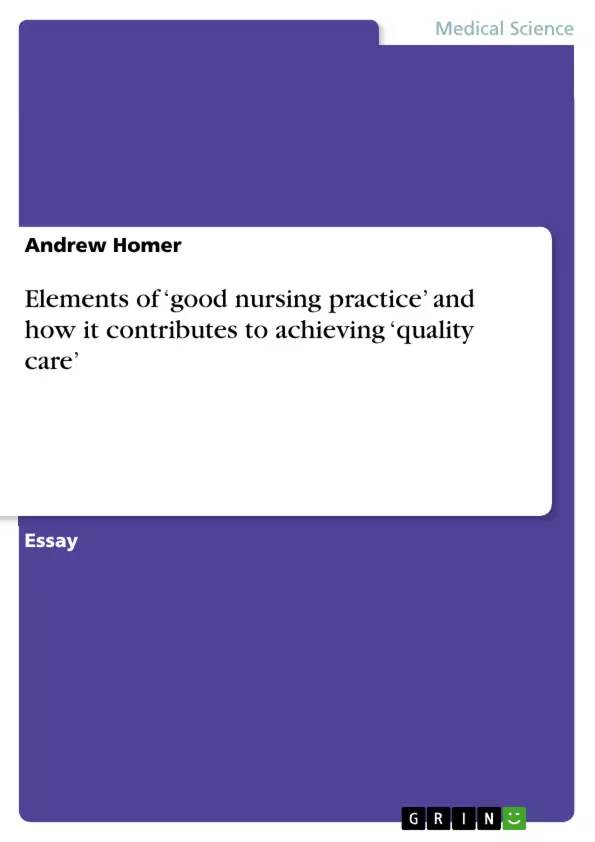The purpose of this essay is to identify the elements of ‘good nursing practice’ and to discuss how this contributes to ‘quality care’. It will begin by talking about the main interpersonal skills and qualities expected of a nurse and then discuss some of the governing bodies of nursing practice. It will look at the nursing Process, the necessity for it and the Roper-Logan-Tierney model as a framework for nursing. The Department of Health (DOH) benchmarks for nursing and institutions set up in order to assess quality will also be briefly discussed.
Inhaltsverzeichnis (Table of Contents)
- Introduction
- Interpersonal Skills and Qualities
- Governing Bodies of Nursing Practice
- The Nursing Process
- The Roper Logan Tierney Model
- The Department of Health (DOH) Benchmarks
- Assessing Quality
- The NMC Code
- The Nursing Process and Quality Care
- The Roper Logan Tierney Model and its Application
- Conclusion
Zielsetzung und Themenschwerpunkte (Objectives and Key Themes)
This essay aims to identify the elements of 'good nursing practice' and explore how these elements contribute to achieving 'quality care'. The essay examines essential interpersonal skills and qualities, key governing bodies, and frameworks for nursing practice. It also delves into the nursing process and its importance in achieving quality care, specifically focusing on the Roper Logan Tierney model.
- The role of interpersonal skills and qualities in delivering quality care.
- The importance of adhering to standards set by governing bodies of nursing practice.
- The application of the nursing process and its impact on quality of care.
- The role of models like the Roper Logan Tierney model in structuring nursing care.
- The multifaceted nature of good nursing practice and its contribution to achieving quality care.
Zusammenfassung der Kapitel (Chapter Summaries)
- The essay begins by defining nursing and highlighting the importance of good interpersonal skills and qualities in building strong patient relationships. Effective listening, information gathering, and empathy are discussed as crucial skills.
- The essay then delves into the governing bodies of nursing practice, specifically focusing on the Nursing and Midwifery Council (NMC) code. The NMC code emphasizes patient care as the top priority and the need to treat each patient as an individual, respecting their cultural and personal beliefs.
- The importance of obtaining informed consent and ensuring patient understanding is emphasized, along with the ethical considerations of respecting patients' rights and preferences regarding treatment.
- The essay explores the concept of the nursing process as a framework for delivering quality care. The Roper Logan Tierney model is discussed as a structured approach to care planning, based on the twelve activities of living.
Schlüsselwörter (Keywords)
This essay focuses on the key concepts of good nursing practice, quality care, interpersonal skills, patient-centered care, the NMC code, informed consent, the nursing process, the Roper Logan Tierney model, and the twelve activities of living. It explores how these factors contribute to achieving quality care and promote a holistic approach to patient well-being.
- Citar trabajo
- Andrew Homer (Autor), 2013, Elements of ‘good nursing practice’ and how it contributes to achieving ‘quality care’, Múnich, GRIN Verlag, https://www.grin.com/document/353858



